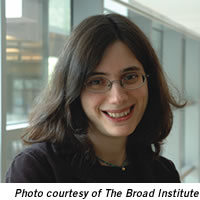2008 Overton Prize: Aviv Regev
 |
|
Picture: 2008 Overton Prize Winner,
Aviv Regev |
Brunak describes 2008 Overton Prize winner Aviv Regev as "a role model for how theoretical computer science can be applied to understanding biological organisms as systems." Trained initially at Tel Aviv University, she knew that her interests lay in bioinformatics “from day one.” She made her first contribution to the field developing mathematical models for the evolution of DNA methylation. It was at that early stage that she realized the value of synergy between computational and “wet lab” biology. “There was no data for one critical phylogenetic group that I was studying, so I went to work in the lab at The Hebrew University to fill in the gaps,” she said. “This experience gave me a good idea of how important it is to anchor theoretical biology in the real world.”
The idea that led directly to her graduate studies, however, came from a branch of computational science that at first glance has little, if any, connection with biology: pi calculus, typically applied to problems in electronic engineering. “I was listening to a conference talk by Robin Milner, on the application of pi calculus to dynamic communication networks, when it occurred to me that molecular networks can have similar properties,” she explains. Following this up, she developed a method for describing and understanding the dynamic relationships between entities in a biological system (such as proteins in an interaction network) using this type of “process algebra.”
After graduation, Regev took her first independent position at the Bauer Center for Genomics Research at Harvard University. There, her research interests switched to the use of probabilistic graphical models to reconstruct networks based on genomic and transcription data, using yeast as a model system.
In 2006, Regev took a position as an assistant professor at MIT and a Core Member of the Broad Institute. She has extended her network models to a range of applications including the characterisation of genes that are co-expressed in a range of cancer types but not in normal cells, and studying gene duplication. Once again, a chance meeting sparked a productive idea. “I was returning from a conference with Jill Mesirov, who had been trying to study variation in the gene expression of the malaria parasite in different patients’ blood cells,” she explains. “Mesirov’s data came from Johanna Daily and Dyann Wirth, infectious disease specialists from Harvard, who suspected that variation in gene expression might explain some of the observed variation in the clinical course of the disease. I wondered whether there might be equivalence to my own classification of yeast gene expression patterns, and so it proved: the malaria samples could be classified into three groups, similar to states characteristic of active growth, a starvation response, and a stress response in yeast.” This work was published in Nature in December 2007, and featured in the Making the Paper section.
This is not the first time that Regev’s work has been recognised by the ISCB. During the last decade, her name has appeared on four ISMB prize-winning posters or papers.
----
This article is excerpted from the July 2008 issue of PLoS Computational Biology. To link to the full journal article please visit www.ploscompbiol.org/article/info:doi/10.1371/journal.pcbi.1000101.



